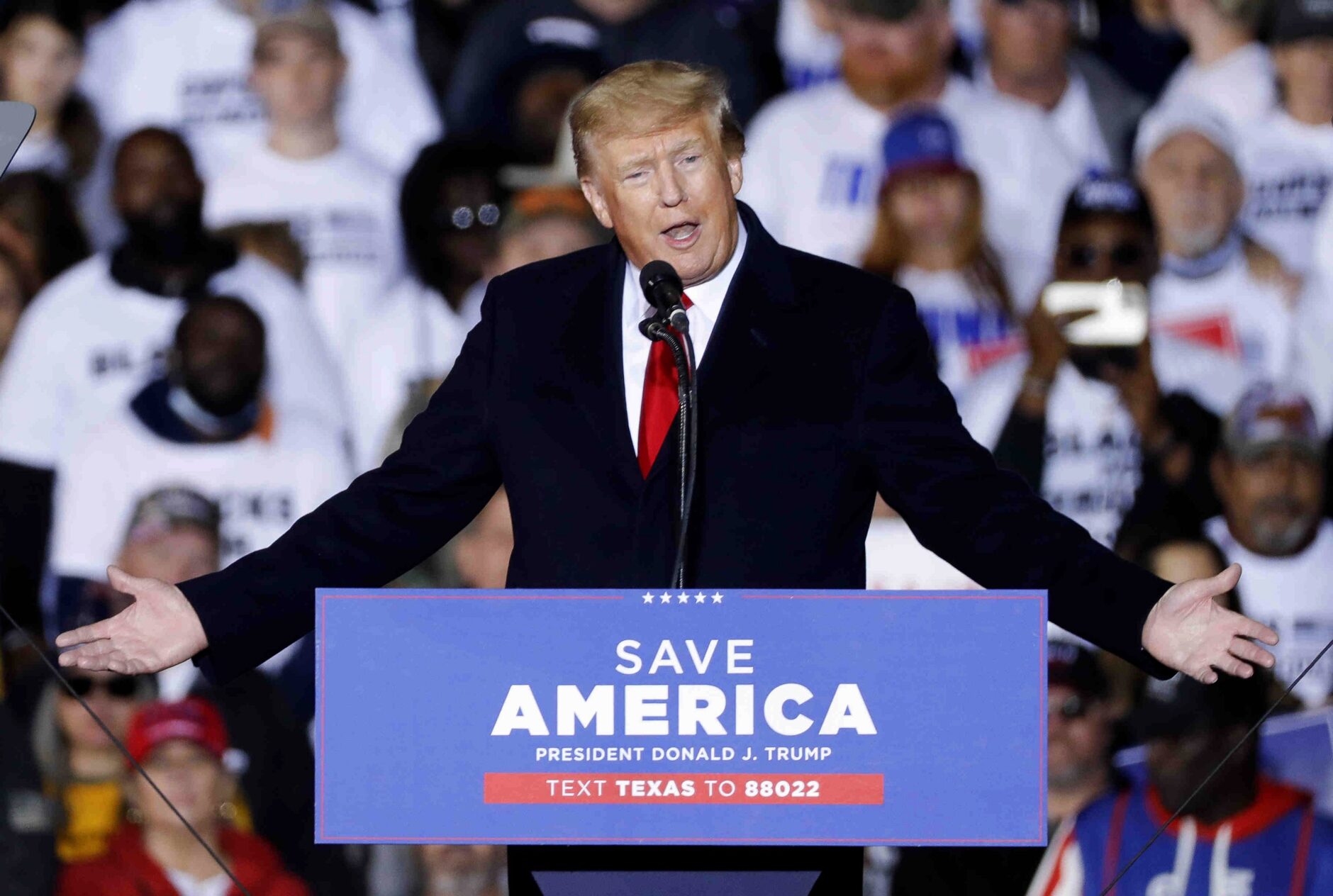"Regardless of what we controlled for, Trump support remained a robust predictor of increases in prejudice," the paper says.
ANDREW J. NELSON / February 21, 2022

Former President Donald Trump speaks at a rally in Conroe, Texas, on Saturday, Jan. 29, 2022. (Jason Fochtman/Houston Chronicle via AP)
(CN) — Racial and religious prejudice increased significantly among Donald Trump supporters during his presidency, according to a the results of 13 studies published Monday by the journal Nature Human Behavior.
The studies included more than 10,000 participants. The researchers, Benjamin C. Ruisch of the University of Kent in the United Kingdom and Melissa J. Ferguson of Yale University, both social psychologists, also found that Trump opponents showed decreases in prejudice.
"These results suggest that Trump's presidency coincided with a substantial change in the topography of prejudice in the United States," the article says.
A scholar not involved in the study said the findings are what most social scientists would expect.
“Trump was able to be a vehicle to express ones' frustration with political correctness and tolerance," said Stephen Farnsworth, author of Presidential Communication and Character: White House News Management from Clinton and Cable to Twitter and Trump. "He didn’t create it. These hostilities existed before him but he was a vehicle to channel that grievance."
Another scholar cautioned that prejudice had increased on both the left and the right of the political spectrum during the Trump years. And anger directed at Trump supporters could have affected their answers to the questions.
“The left didn’t want to just demonize Trump, they wanted to demonize the people who supported Trump," said Tim Hagle, an associate professor of political science at the University of Iowa, who like Farnsworth had not seen the studies. "If you keep calling people racist, pretty soon they are going to say, 'This is what I believe. You can say anything about me that you want.'”
The studies examined prejudice against Muslims, Black people and other groups.
"Regardless of what we controlled for, Trump support remained a robust predictor of increases in prejudice," the paper says.
What attitudes like these portend is not clear, said Farnsworth, professor and director center for Leadership and Media Studies at the University of Mary Washington in Virginia. In American history, hate has sometimes been rewarded at the ballot box, but those movements come and go.
He also noted that some high-profile Republican office holders — Senators Marco Rubio, Ted Cruz and Tim Scott, for example — are members of minority groups.
“It makes sense to think of American politics as something like a pendulum," he said. "One side prevails, the other side fights back. We don’t have permanent political party majorities. We don’t have permanent political party minorities. Republicans five years from now may find a libertarian message more appealing than appeals to racial identity.”
(CN) — Racial and religious prejudice increased significantly among Donald Trump supporters during his presidency, according to a the results of 13 studies published Monday by the journal Nature Human Behavior.
The studies included more than 10,000 participants. The researchers, Benjamin C. Ruisch of the University of Kent in the United Kingdom and Melissa J. Ferguson of Yale University, both social psychologists, also found that Trump opponents showed decreases in prejudice.
"These results suggest that Trump's presidency coincided with a substantial change in the topography of prejudice in the United States," the article says.
A scholar not involved in the study said the findings are what most social scientists would expect.
“Trump was able to be a vehicle to express ones' frustration with political correctness and tolerance," said Stephen Farnsworth, author of Presidential Communication and Character: White House News Management from Clinton and Cable to Twitter and Trump. "He didn’t create it. These hostilities existed before him but he was a vehicle to channel that grievance."
Another scholar cautioned that prejudice had increased on both the left and the right of the political spectrum during the Trump years. And anger directed at Trump supporters could have affected their answers to the questions.
“The left didn’t want to just demonize Trump, they wanted to demonize the people who supported Trump," said Tim Hagle, an associate professor of political science at the University of Iowa, who like Farnsworth had not seen the studies. "If you keep calling people racist, pretty soon they are going to say, 'This is what I believe. You can say anything about me that you want.'”
The studies examined prejudice against Muslims, Black people and other groups.
"Regardless of what we controlled for, Trump support remained a robust predictor of increases in prejudice," the paper says.
What attitudes like these portend is not clear, said Farnsworth, professor and director center for Leadership and Media Studies at the University of Mary Washington in Virginia. In American history, hate has sometimes been rewarded at the ballot box, but those movements come and go.
He also noted that some high-profile Republican office holders — Senators Marco Rubio, Ted Cruz and Tim Scott, for example — are members of minority groups.
“It makes sense to think of American politics as something like a pendulum," he said. "One side prevails, the other side fights back. We don’t have permanent political party majorities. We don’t have permanent political party minorities. Republicans five years from now may find a libertarian message more appealing than appeals to racial identity.”
No comments:
Post a Comment